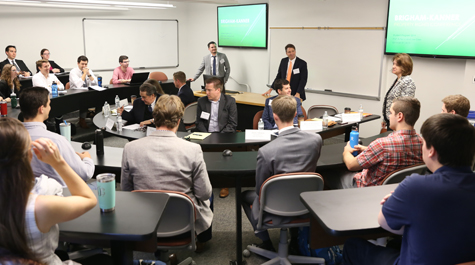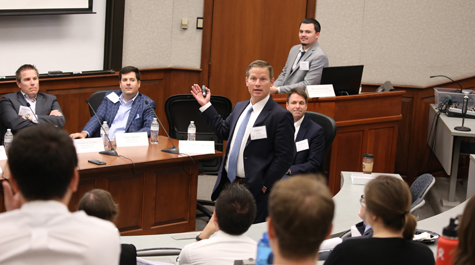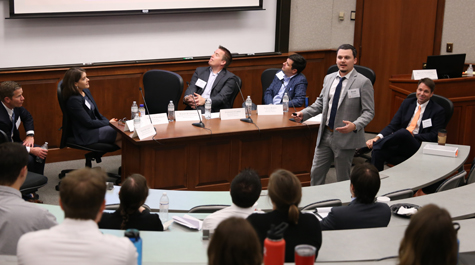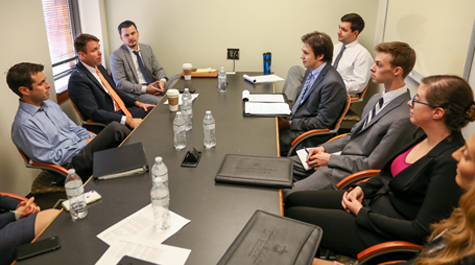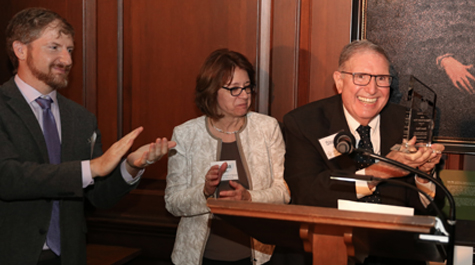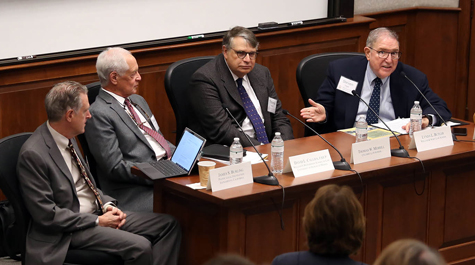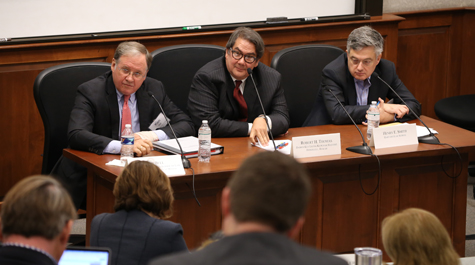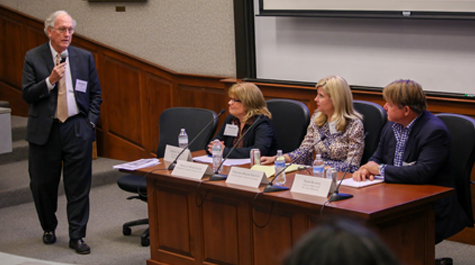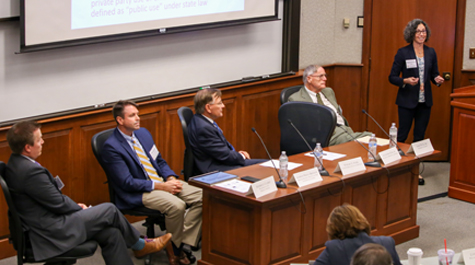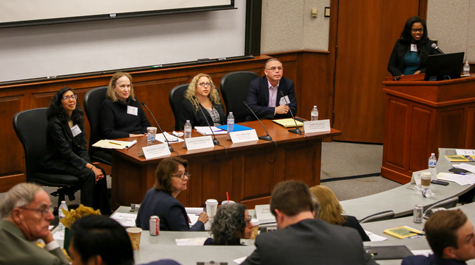Annual Property Rights Conference Benefits Practitioners, Academics and Students
Since 2004, the Brigham-Kanner Property Rights Conference at William & Mary Law School has brought members of the bench, bar and academia together to explore recent developments in the law that affect property rights.
And thanks to the William & Mary Property Rights Project, more and more William & Mary law students are joining in.
This year’s conference, held on October 3-4, opened with a day of preconference activities for students. A number of property rights experts were on hand to share their knowledge, including Andrew Prince Brigham and Brett S. Tensfeldt (Brigham Property Rights Law Firm, PLLC), Joshua Baker and Stephen Clarke (Waldo & Lyle, P.C.), Robert H. Thomas (Damon Key Leong Kupchak Hastert and Joseph T. Waldo Visiting Chair in Property Rights Law at William & Mary), Christian Torgrimson (Parker Poe), Justin Hodge (Ellis & Hodge), and Shane Rayman (Rayman Beitchman).
The first preconference session, “Property Rights Practice: Perspectives from Trial Lawyers,” saw the attorneys presenting on topics ranging from the constitutional basis of property rights (in the United States and Canada), the valuation of property taken by eminent domain, and effectively communicating land use issues to juries.
A lunch presentation on “Snapshots from a Property Rights Practice” followed. In a panel setting, the experts discussed and fielded questions including best advice on how to prepare for trial, memorable cases/clients, and general discussion on work/life balance.
The last session, a law student workshop, allowed students to sit across the table from members of the practicing bar to hone their interview skills and ask questions not normally entertained by lawyers interviewing them for potential job placement.
“I really enjoyed the informal conversation with the four practitioners after the lunch hour presentation on Thursday,” said Ryan Franklin ’21. “It was a great opportunity to ask specific questions and learn more about current, hot-button property rights issues.”
That evening, during the conference’s annual dinner, the Brigham-Kanner Property Rights Prize was awarded to Professor Emeritus Steven J. Eagle of the Antonin Scalia Law School at George Mason University. The prize is named in honor of the lifetime contributions of Toby Prince Brigham, founding partner of Brigham Moore, LLP, and Gideon Kanner, professor of law emeritus at Loyola Law School in Los Angeles, and is presented annually to a scholar, practitioner or jurist whose work affirms the fundamental importance of property rights. Read more about Professor Eagle.
The following day, scholars and practitioners reconvened for panel discussions and moderated sessions. Panels (which are linked below to W&M Law School’s YouTube page) included:
- The State of Regulatory Takings Jurisprudence: A Tribute to Eagle (includes opening remarks by Steven J. Eagle) - Thomas W. Merrill, David L. Callies, James S. Burling. Moderator: Lynda L. Butler
- Public Resources and Private Rights - Henry E. Smith, Ken Bell, Robert H. Thomas. Moderator: Katherine Mims Crocker
- Lunch Roundtable: Emerging Issues in Takings Litigation - Virginia Norton, Mark F. (Thor) Hearne II, Shelley Saxer. Moderator: Joseph T. Waldo
- Natural Gas and Other Energy Takings: Protecting Private Property Rights When the Public Interest Is Promoted by a Non-Governmental Entity - James W. Ely Jr., Stewart E. Sterk, Alexandra Klass, Andrew Prince Brigham. Moderator: Stephen J. Clarke
- Property and Poverty - Laura Underkuffler, Rashmi Dyal-Chand, Dana Berliner, Larry Salzman. Moderator: Myrisha S. Lewis
For podcasts of the above panels, please visit our SoundCloud page.
With its focus on bringing the best experts to campus, the conference gave students a lot of practical information on careers in property rights.
“The Brigham-Kanner Conference is an extraordinary opportunity to hear some of the top property practitioners and academics talk about current issues,” said Makenna Johnson ’21. “The conference is unique in that not only are the speakers and attendees there to learn from each other, they also want to encourage and offer advice for the upcoming generation of property practitioners.”
For Will Newman ’21, a strength of the conference is its shear breadth, with subject matter ranging from pure theory to deep looks into what is happening to property owners in the country today, and from technical property issues to civil rights.
“The complexity of content ranges from rudimentary to highly complex, so people of various levels of knowledge on the subject matter can enjoy what is offered,” Newman said. “Not only is it an opportunity to learn, it's an opportunity to network with some big fish brought to a small pond.”
Having attended previous conferences, many students return for more. Kacie Couch ’21, for instance, attended last year’s 15th anniversary conference and couldn’t wait for this year’s event.
“Although I had not yet taken property, the enthusiasm with which the panelists approached their topics immediately interested me,” Couch said. “Returning to the conference this year as a Land Use and Eminent Domain student, I am excited to share in the panelists enthusiasm! The Brigham-Kanner Property Rights Conference has allowed me to build upon my solid foundation of property law and to develop a firm understanding of the current issues in takings. We are so fortunate to have some of the most accomplished lawyers and scholars in the nation visiting us and I’m grateful to William & Mary for encouraging student participation and networking opportunities through this event.”
For a visual overview of the conference, please visit our photo gallery.
Papers from the conference will be published in Volume 9 (2020) of the Brigham-Kanner Property Rights Journal, published by the William & Mary Law School Property Rights Project.
About William & Mary Law School
Thomas Jefferson founded William & Mary Law School in 1779 to train leaders for the new nation. Now in its third century, America's oldest law school continues its historic mission of educating citizen lawyers who are prepared both to lead and to serve.
